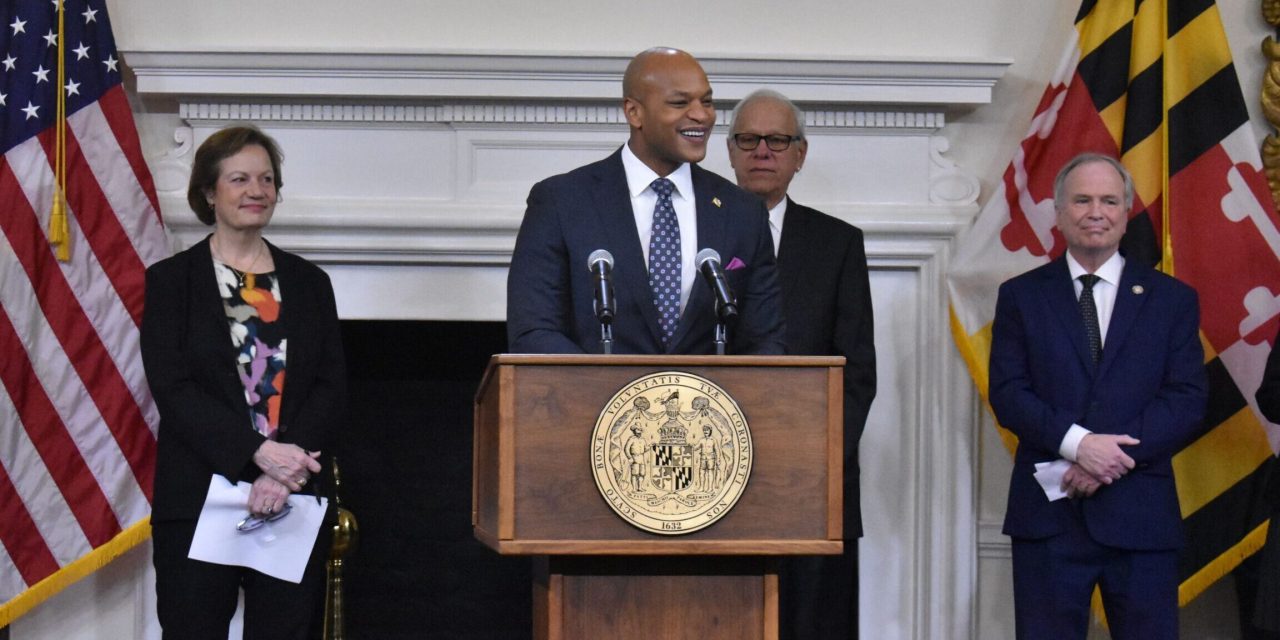By KIERSTEN HACKER
Capital News Service
ANNAPOLIS, Md. — Gov. Wes Moore announced plans Friday for spending $90 million on reducing carbon pollution in Maryland, using an unexpected pot of money to fight what he called “environmental injustice.”
The largest portion of the money, $50 million, will go toward decarbonizing community buildings like hospitals, multifamily housing, and schools, under the plan Moore outlined. The state will devote $23 million to electric vehicle charging stations and $17 million to electric school buses for public schools.
Moore emphasized the need for partnership among advocates, lawmakers and his administration, unveiling the new details along with representatives of each, crowded elbow-to-elbow in his reception room at the State House.
“We’re joined today by members of every single segment of our society, who are all saying with a collective voice that the climate crisis is one of the biggest challenges that we share,” Moore said. The fight to make Maryland the “cleanest and greenest” doesn’t just take words, the governor said, “it takes work.”
The work takes funding, too, and like other issues being discussed in this legislative session, future funding solutions are uncertain. Eventually, the administration’s Climate Pollution Reduction Plan will cost the public sector about $1 billion per year, according to the state’s own projections.
At the same time, state officials are obligated by their own 2022 law to decrease greenhouse gas emissions – and in fact to reach net-zero emissions by 2045. This year, the state had an extra accumulation of money in one of its funds, according to state officials, and Moore decided to use it to advance those goals.
State officials still face difficult fiscal choices in the next few years, with spending projected to outpace revenues by growing margins. Environment Secretary Serena McIlwain acknowledged that creative new funding solutions will be necessary to continue implementation of the agency’s plan in the years to come.
McIlwain said, the agency is still looking for solutions and will work in partnership to find them. Climate change is here, she said.
“This is real,” she said. “We don’t have time to play around and waste time. We have to do what we need to do to move forward.”
Long-term plans to address climate change and make Maryland a leader in climate action will be fiscally responsible, the governor said.
“If you look at how we have managed this entire budget, we have shown that being fiscally disciplined and being fiscally responsible and also being bold, don’t have to be mutually exclusive ideas, mutually exclusive thoughts,” Moore said.
According to Moore, his new proposal requires that a minimum of 50% of the investments go to “historically undervalued, historically under-seen and historically underestimated” communities. The installation of electric-vehicle charging stations will start in low- and moderate-income communities, the governor said.
Those who often come last, Moore said, should come first.
“Climate justice is economic justice,” Moore said.
Paul G. Pinsky, director of the Maryland Energy Administration, echoed the idea.
“Just as many of the problems that cause climate change are disproportionately affecting the underserved and overburdened, those very same people need to be part of the solution,” said Pinsky.
Children must be a part of the solution, too, leaders said. Kim Coble, executive director of the Maryland League of Conservation Voters, stressed the need to take action for the future of children and their health.
She said she is a new grandma, and she teared up at the podium as she pointed out her son in the audience.
“If we don’t take action for them,” Coble said. “What’s the point?”




Recent Comments